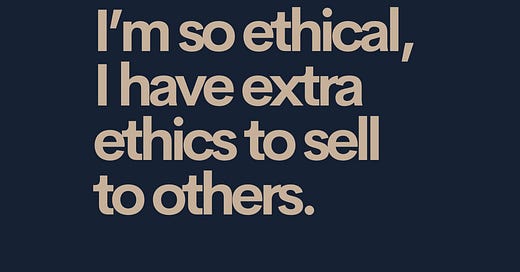My big problem with the idea of “Ethical Marketing” and why it actually matters
Spoiler: This post is not at all about marketing.
Because marketing is not the problem.
That’s why.
Marketing is just a tool.
Business is just a tool.
And our judgments around actions and behaviors are profoundly and perpetually subjective.
So when you say one marketing strategy is ethical and another is not, what you’re actually saying is that YOU, as the marketer, are ethical - and others are not.
And when…
Keep reading with a 7-day free trial
Subscribe to Illana Has Thoughts to keep reading this post and get 7 days of free access to the full post archives.





